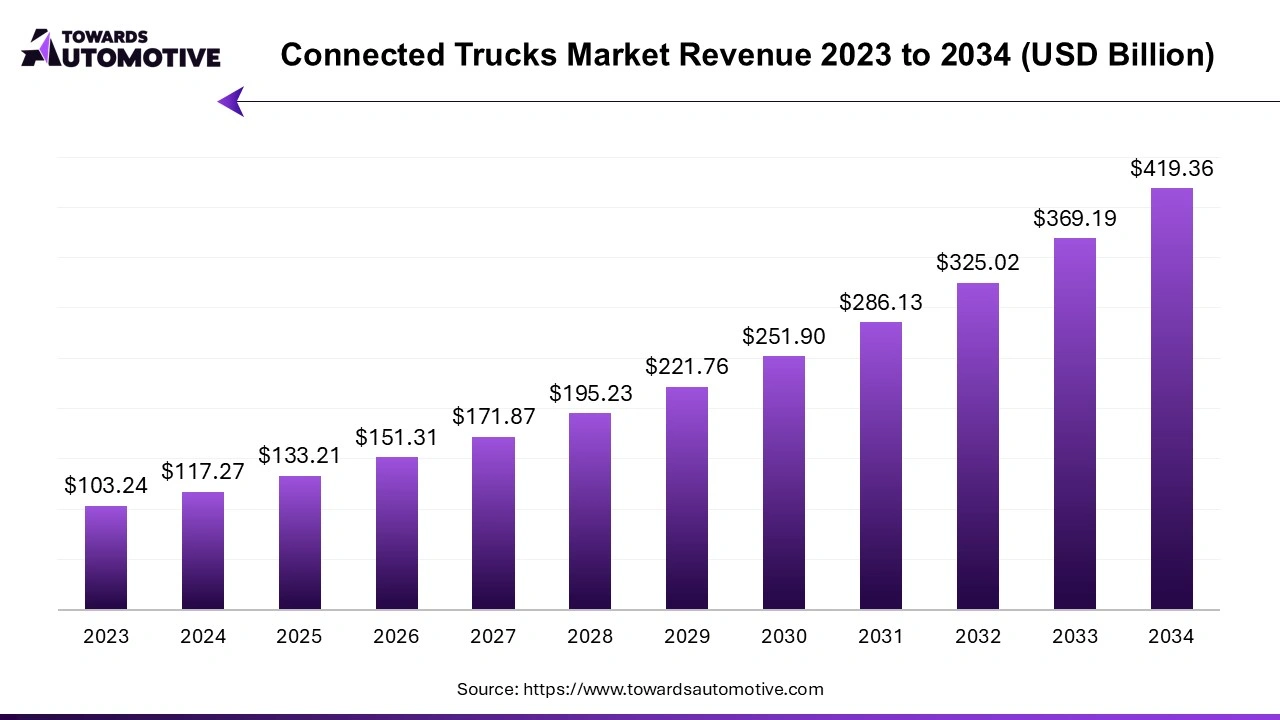The light commercial vehicle (LCV) segment has emerged as a dominant player in the global connected trucks market, driving significant growth in the transportation and logistics sectors. With the global connected trucks market size calculated at USD 117.27 billion in 2024 and expected to be worth USD 419.36 billion by 2034, expanding at a compound annual growth rate (CAGR) of 13.59% from 2024 to 2034, LCVs are poised to play a crucial role in shaping the future of this rapidly growing industry.

Get All the Details in Our Solution – Download Brochure @ https://www.towardsautomotive.com/download-brochure/1290
The increasing demand for last-mile delivery services, urban logistics, and small-scale transportation solutions, particularly in light of the rise of e-commerce, has made LCVs an essential component of the global transportation ecosystem. These vehicles, equipped with connected technology, are transforming the way businesses manage their fleets, optimize their operations, and enhance driver and passenger safety.
The Growth of LCVs in the Connected Truck Market
As e-commerce continues to expand, the need for efficient transportation solutions in urban and suburban areas has intensified. Light commercial vehicles are perfectly suited to meet these needs, offering flexible, cost-effective solutions for businesses involved in local deliveries and small-scale transportation. Connected technology plays a vital role in improving the performance of these vehicles, helping businesses stay competitive in an increasingly fast-paced market.
LCVs equipped with connected technology offer enhanced functionality, including optimized route planning, monitoring of driver behavior, and improved fuel efficiency. By leveraging these advanced systems, businesses can maximize productivity while keeping costs low. Connected LCVs enable fleet managers to manage and monitor their vehicles with precision, ensuring that the fleet operates at its full potential.
Benefits of Connected Technology for Fleet Management
One of the standout advantages of connected LCVs is the improvement in fleet management. The integration of telematics and real-time data analytics allows fleet managers to track the location, performance, and maintenance requirements of each vehicle in the fleet. This real-time data helps in several critical areas:
- Route Optimization: By analyzing traffic patterns and vehicle performance, businesses can optimize routes, reducing fuel consumption and minimizing idle time.
- Maintenance Management: Real-time monitoring of vehicle health helps prevent unexpected breakdowns by alerting managers to maintenance needs before they lead to costly repairs.
- Cost Reduction: The ability to optimize fleet operations not only reduces fuel costs but also lowers operational expenses, contributing to overall business profitability.
These improvements ensure that businesses involved in last-mile delivery and urban logistics can meet the rising demand for efficient services, while also maintaining high levels of customer satisfaction through timely deliveries.
Enhancing Safety and Compliance
Safety is another crucial factor driving the adoption of connected technology in light commercial vehicles. As LCVs navigate busy urban areas, the need for enhanced driver safety has become more pronounced. Advanced driver assistance systems (ADAS), which are integrated into connected vehicles, provide an additional layer of security by offering features such as:
- Lane-keeping assist
- Collision avoidance
- Adaptive cruise control
These safety features help reduce the likelihood of accidents, ensuring that cargo and drivers reach their destinations safely. This is particularly important in urban settings, where dense traffic and road hazards pose a greater risk.
Moreover, as governments worldwide tighten emissions regulations, connected LCVs offer solutions to help businesses manage fuel consumption and reduce carbon emissions. Intelligent fuel management systems optimize fuel usage, ensuring compliance with environmental standards while also lowering operational costs. This dual benefit of sustainability and cost-efficiency is driving the growing adoption of connected LCVs in industries ranging from e-commerce to logistics and transportation.
Invest in Our Premium Strategic Solution @ https://www.towardsautomotive.com/price/1290
You can place an order or ask any questions, please feel free to contact us at sales@towardsautomotive.com
Explore the comprehensive statistics and insights on automotive industry data and its associated segmentation: Get a Subscription
For Latest Update Follow Us: https://www.linkedin.com/company/towards-automotive
